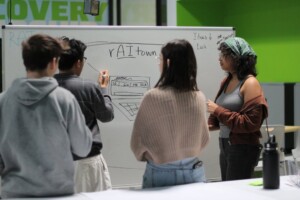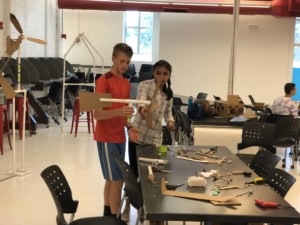10 edu-entrepreneurial opportunities
With the Race to the Top language out, it’s time to refine the list of opportunities for education entrepreneurs (both .org & .com). From largest to niche size they include:
1. School improvement: between RTT, Inovation, and School Improvement, there will be a couple billion spent on attempts to improve struggling schools. America’s Choice should be well positioned as will a new services group at Pearson. Groups like AdvancePath that target under-credited students as a school-within-a-school should also do well.
2. CMO/EMO: with grant money and air cover from Obama and Duncan, the demand for high quality charters has never been stronger. If CMOs like Green Dot can figure out a reliable conversion strategy, several will finally achieve scale. A for-profit operator, National Heritage is now twice as big as Green Dot and bigger than the KIPP network. It will help if RTT helps improves access to public facilities.
4. Assessment: the big guys will continue to own state contracts, but there’s a new opening for formative and periodic assessment. Groups like Wireless Generation are well positioned to take advantage of the push for quick tests that improve instruction.
5. Adaptive content & learning games: Over the next five years, we’ll see a third of the $8B textbook business shift to digital with a third of that going to the new field of adaptive content and games.
6. Training: It has been a tough year in the professional development business, but that should change as federal funding flows. Where data is linked to evaluation, we’ll see strong demand for targeted training.
7. Consulting: lots of states, districts and schools need lots of services including data integration, policy development, program design and implementation (i.e., evaluation), grant writing, program management, and communications.
8. Advocacy: The big bucks and big demands on the system will make the next few years very dynamic. We need a ConnCAN in every state to connect communities, lawmakers, and policy experts. We need to mobilize underserved communities to steer school improvement and new school opportunities.
9. Evaluation: evaluating $5B of spending will yield $250M of evaluation contracts—it’s a good time to be MDRC.
10. Web 2.0: with dozens of new entrants in the social learning space and content management and student information systems incorporating web 2.0 functionality, we’re bound to see a couple of these gain widespread adoption in the next four school years.





Quentin L. Messer, Jr.
Tom,
Any thoughts about an "eduventure" that aims to transform the labor dynamics of the market, meaning alternatives to schools of education? Despite the success of TFA and NTP, there are areas of the country largely untouched by these outstanding programs? Could we leverage the unfortunate professional dislocation within the midwestern industrial base to repopulate teaching staffs within that region for example?
Thanks for the blog!
Replies
Tom Vander Ark
I'm a fan of network embedded prep/development. High Tech High certifies their own teachers and has a GSE offering masters degrees. I think there is a NY CMO collaboration with Bank St. These tailored programs will prepare teachers for the learning environment they'll be working in.
Tom Vander Ark
Correction (from Whitney Tilson) Hunter College developed a national partnership with the KIPP Academies, Uncommon Schools, Achievement First and Teach for America to create a dedicated teacher preparation program for charter and non-charter school teachers geared to the unique challenges of urban schools. Known as Teacher U at Hunter, the partnership has gained national attention for rethinking what rigorous teacher preparation looks like.
Quentin L. Messer, Jr.
Is there an edventure opportunity for similar efforts in other charter dense parts of the country such as the Industrial Midwest or Southeast (FL, GA and SC)? I fear that there isn't the mechanisms for sustaining the human capital ecosystems necessary to maintain quality in places like Ohio, Michigan or Indiana. Indiana's MindTrust is a notable exception; however, I don't know of analogs elsewhere within the regions that I mentioned.
Sterlace
Thumbing through the science equipment catalogs has given me a few entrepreneurial ideas. Those guys are making a fortune.
Dave Saba
ABCTE offers an online recruitment, preparation and certification program for teachers now accepted in 9 states. Completely scalable and sustaining right now. http://www.abcte.org
As for #5, keep an eye on a company called Scholarity - they are coming out with an adaptive tutor-like software platform for curriculum. It is pretty amazing.